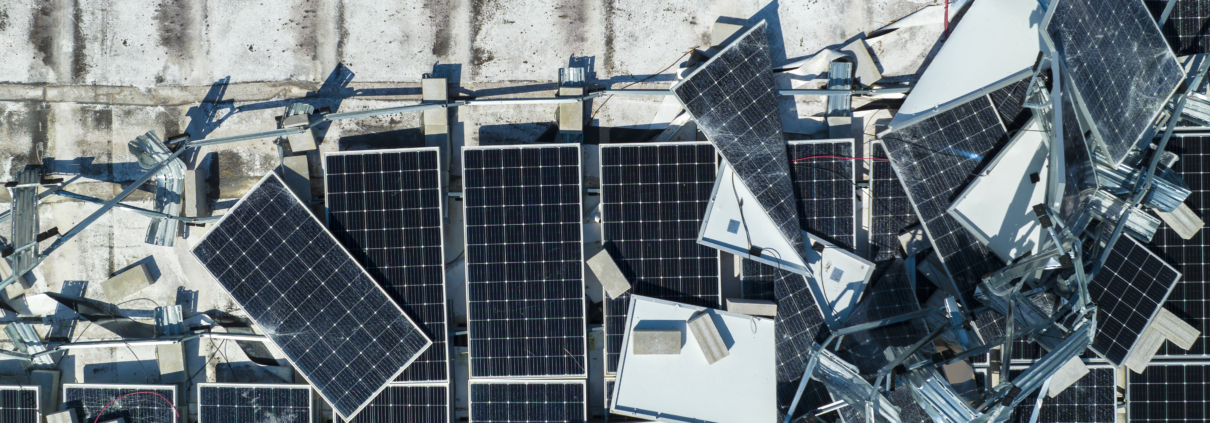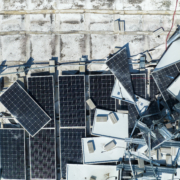Solar panel recycling: importance and benefits

The recycling of solar panels is a crucial aspect in the management of electronic waste. As solar energy expands, it becomes necessary to address the future of panels once they reach the end of their useful life. This process brings significant benefits, contributing to sustainability and reducing environmental impact. In addition, it facilitates the recovery of valuable materials and promotes a more efficient circular economy.
Importance of solar panel recycling
The relevance of solar panel recycling becomes a crucial aspect in the current context, as it contributes to the sustainability and well-being of the planet. Proper management of these end-of-life materials is a necessary step towards a cleaner future.
Contribution to sustainability
As the adoption of solar energy increases, the need for responsible management of the waste generated becomes apparent. The recycling of solar panels plays a vital role in environmental sustainability, allowing the materials that make up the panels to be reused instead of being discarded, which helps to close the life cycle of these products. Implementing effective recycling practices ensures the protection of natural resources and promotes a healthier environment.
Impact on the circular economy
The circular economy seeks to optimize the use of resources, and the recycling of solar panels is a clear example of this philosophy. It facilitates the transformation of waste into valuable resources, promoting a more sustainable economic model.
Reduction of photovoltaic waste
Recycling solar panels contributes to significantly reducing the amount of photovoltaic waste generated. In a growing industry, proper management of this waste becomes imperative to avoid the accumulation of materials in landfills, which could prove harmful to the environment.
Reuse of recovered materials
The recycling process is not only limited to the disposal of waste, but also allows for the recovery of valuable materials. Components such as glass and aluminum can be reused in the manufacture of new products, reducing the need to extract new raw materials and decreasing the ecological footprint of new production.
Benefits for the environment
Recycling solar panels brings a number of environmental benefits that are essential in the fight against climate change. Maintaining a sustainable approach to waste management is key to preserving ecosystems and minimizing the negative impact on the planet.
Waste reduction in landfills
One of the most outstanding advantages is the reduction of waste in landfills. By recycling solar panels, you prevent a large portion of them from ending up in these places, which contributes to the health of the environment by reducing pollution and the use of landfill space.
Reduction of raw material extraction
Recycling also plays a critical role in reducing the extraction of raw materials. By harnessing existing materials rather than sourcing new ones, the environment is protected by reducing mining and associated production, leading to a drive towards sustainability and resource conservation for future generations.
Composition of solar panels and their recycling
Understanding the composition of solar panels is crucial to developing effective recycling strategies. These structures have various materials that, at the end of their useful life, can be reused or recycled.
Materials in solar panels
Solar panels are made up of several components, each with its own function and properties. This diversity of materials is what allows it to work correctly in the conversion of solar energy to electricity.
Use of glass and aluminum
78% of solar panels consist of glass, which provides protection and structural support. The use of glass is not only efficient in terms of weight, but also allows sunlight to pass through. On the other hand, aluminium, which makes up approximately 10% of the structure, is essential for the manufacture of frames and supports. Its lightness and corrosion resistance make it an optimal material for this application.
Silicon and other components
Silicon, a semiconductor, accounts for about 5% of the composition of the plates. This material is essential for the conversion of solar energy into electricity. Along with silicon, other elements such as copper and silver can be found, which are used in electrical connections, although in smaller proportions. These components, although in smaller quantities, also have significant value during the recycling process.
Solar panel recycling process
Solar panel recycling is a multi-stage procedure to ensure the effective recovery of the materials contained in them. This process has been refined to maximize sustainability and efficiency.
Stages of the recycling process
- Disassembly: In this phase, the panels are disassembled to separate the different components.
- Heat treatment: Heat is applied to break down some materials, making separation easier.
- Classification: Materials are grouped according to their type for further treatment.
Material Recovery
The recovery of materials is one of the pillars of recycling. During the process, up to 90% of the panels’ components can be recovered, including high-quality glass and aluminum, as well as valuable metals such as silicon and copper. This recovery is vital to reduce the environmental impact of manufacturing new components.
Innovation in recycling techniques
Recycling technologies are constantly evolving. New research and developments have allowed the implementation of more efficient and less polluting methods. Techniques such as chemical recycling and physical processes are being explored to improve the purity of recovered materials, which in turn increases their value in the market.
Legal framework and regulations for recycling
The regulations and directives governing recycling are essential to ensure proper management of the waste generated by solar panels. These regulations establish clear frameworks that regulate both the liability of manufacturers and the rights and duties of consumers.
European Directives on Waste Electricity
The European Union has implemented various directives that address the management of electrical and electronic waste. The most relevant in this context is Directive 2012/19/EU, which establishes a framework for the correct management of this waste. This regulation requires Member States to adopt effective measures to promote recycling and minimise the environmental impact of electrical waste.
In particular, the directive sets clear targets, such as the recovery of at least 80% of materials from solar panels, which helps to promote sustainability in the PV industry.
Legal requirements and management obligations
Legal requirements are essential to ensure a correct life cycle of solar panels. These regulations force various parties involved in the production and management of these devices to fulfill certain responsibilities, ranging from manufacturing to final disposal.
Role of manufacturers and consumers
- Manufacturers must inform consumers about how to recycle by providing clear and accessible information.
- They are required to ensure that their products are recyclable and to contribute effectively to the creation of efficient recycling systems.
- For their part, consumers have a responsibility to follow recycling guidelines and actively participate in the correct disposal of solar panels at the end of their useful life.
Electrical and electronic equipment management
The management of electrical and electronic equipment is part of a broader context, where multiple directives work together. These regulations are necessary not only for solar panels, but also for other electronic devices that generate waste, encouraging a more comprehensive and sustainable approach.
Through the implementation of these regulations, the aim is to reduce waste generation, promoting recycling systems that optimize the recovery of valuable materials, thus contributing to a more sustainable future.
Spain is developing a series of innovative projects to improve the recycling of solar panels. These efforts seek to optimize the management of photovoltaic waste and ensure that the country is positioned as a leader in sustainability in this area.
Challenges and future of solar panel recycling
The recycling of solar panels faces various challenges today, but there are also opportunities for its future development. As the industry continues to evolve, it is essential to address existing constraints and encourage innovations that improve the recycling process.
Current limitations on recycling
One of the main obstacles in this field is the lack of adequate infrastructure for the collection and treatment of end-of-life solar panels. Many regions lack specialized facilities to ensure effective recycling, which prevents optimal recovery of materials. Added to this is the variability in the composition of the panels, which can hinder standardized recycling processes.
Another notable challenge is the limited knowledge and dissemination on this topic. Many consumers are unaware of the options available to recycle solar panels, resulting in more waste ending up in landfills. This problem is even more pronounced in regions where recycling regulations are less stringent.
Expected innovations in the sector
The future of solar panel recycling looks promising, driven by technological advancements being introduced to the sector. The adoption of new recycling methods, which employ more efficient technologies, could facilitate the recovery of valuable materials with greater purity. These innovative processes will not only allow for better valorization of components, but will also reduce the cost and environmental impact of recycling.
Technological advances in recycling
Among the innovations being developed are advanced separation and purification technologies. For example, chemical and thermal techniques are optimizing the recovery of silicon and other precious metals. These methodologies not only increase the percentage of recovered materials, but also improve their quality, which is essential for their reuse in the manufacture of new panels.
Global research and development projects
- International initiatives seek to establish common standards in the recycling of solar panels.
- Collaborations between universities, research centres and companies are encouraging innovation in recycling processes.
- Experimental projects are being carried out that allow the analysis of new methods for the recycling of critical components.
Fostering social awareness
Raising awareness of the importance of recycling solar panels is essential to promote their correct management. Without increased public awareness, efforts to drive sustainability may be limited. It is necessary to establish educational programs that inform both consumers and companies about the relevance of recycling and how they can actively contribute to it.
Education and awareness programs
- Educational campaigns can help demystify the recycling process and facilitate its adoption.
- Initiatives in collaboration with schools and communities can promote environmental responsibility from an early age.
- Awareness programmes can include workshops, seminars and informational materials that highlight the need to properly manage solar panel waste.
Are you looking for a sustainable solution for solar panel recycling? At Reverter Industries, we design solar panel recycling plants equipped with the most advanced technology to maximize material recovery and minimize environmental impact.





